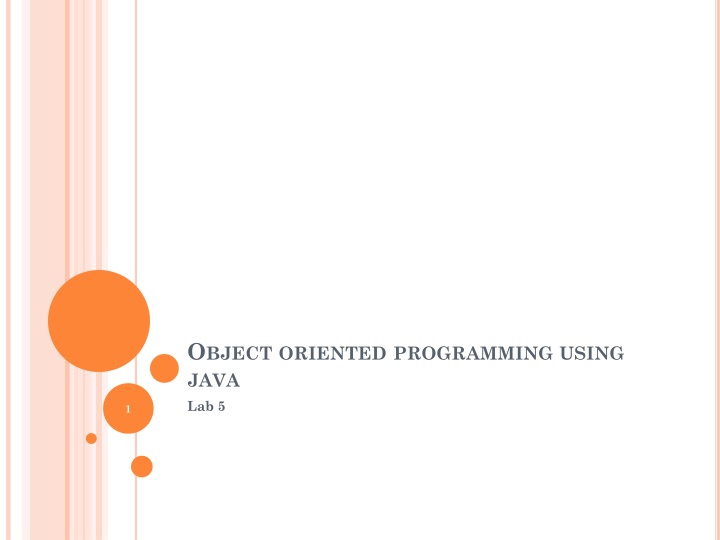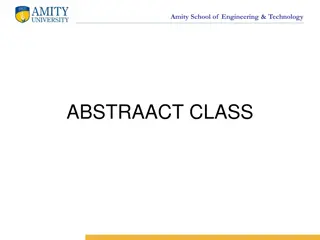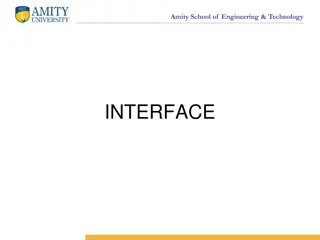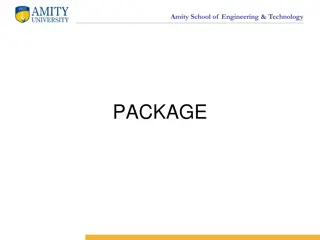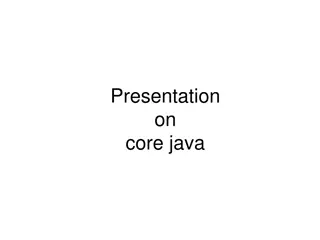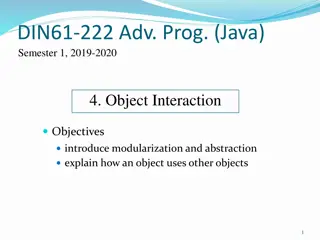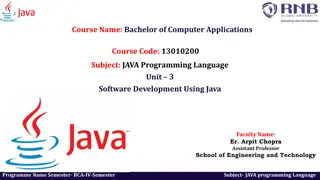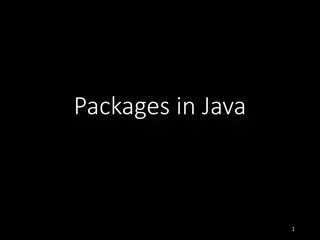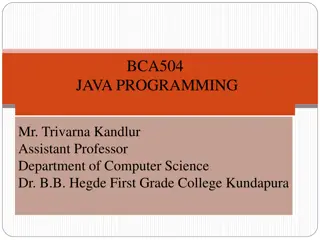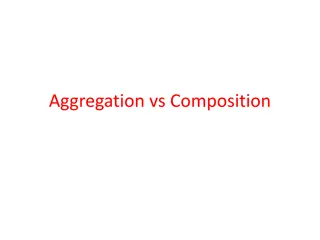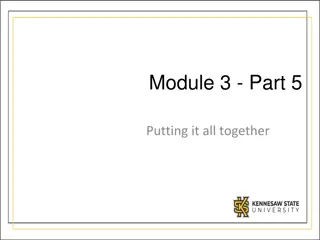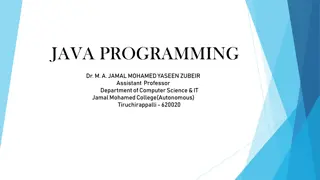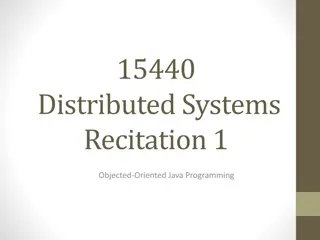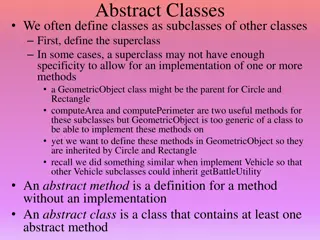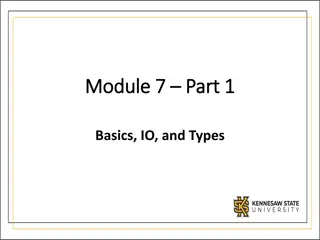Object Oriented Programming Using Java Lab 5.1 Overview
The lab covers topics such as Strings, Inheritance, Overriding methods, Super and Final keywords, Abstract classes, and more. There will be a practical OOP quiz before the midterm for Group A and Group B. Examples and explanations on String manipulation, converting between numbers and strings, and the principles of OOP are also provided.
Download Presentation

Please find below an Image/Link to download the presentation.
The content on the website is provided AS IS for your information and personal use only. It may not be sold, licensed, or shared on other websites without obtaining consent from the author.If you encounter any issues during the download, it is possible that the publisher has removed the file from their server.
You are allowed to download the files provided on this website for personal or commercial use, subject to the condition that they are used lawfully. All files are the property of their respective owners.
The content on the website is provided AS IS for your information and personal use only. It may not be sold, licensed, or shared on other websites without obtaining consent from the author.
E N D
Presentation Transcript
OBJECT ORIENTED PROGRAMMING USING JAVA Lab 5 1
AGENDA Strings Inheritance Overriding methods Super keyword Final keyword Abstract classes 2
REMINDER There will be a practical OOP quiz in sections the week before midterm, in the sections for both group (A & B). The first hour of each section to quiz Group A of the section and the second hour to quiz group B. 3
STRING EXAMPLE package practice; public class B{ public static void main(String[] args) { String str1 = "Hi"; String str2 = "Hi"; System.out.println(str1==str2); System.out.println(str1.equals(str2)); String newStr1 = new String("Hi"); String newStr2 = new String("Hi"); System.out.println(newStr1 == newStr2); System.out.println(newStr1.equals(newStr2)); System.out.println(str1 == newStr1); System.out.println(newStr2.compareTo(newStr1)); true true false true false 4 0
CONT String str = new String("hello World"); str.concat("i'm here"); System.out.println(str); str = str.concat(",i'm here"); System.out.println(str); System.out.println(str.length()); System.out.println(str.indexOf("World")); System.out.println(str.substring(0, 4)); } } Hello World Hello world, I m here 20 6 hello 5
CONVERTING BETWEEN NUMBERSAND STRINGS public class StringToIntExample{ public static void main(String args[]){ String s="200"; int i=Integer.parseInt(s); System.out.println(s+100); 200100 float a = (Float.valueOf( 10.5 )).floatValue(); System.out.println(a); 10.5 String s1=String.valueOf(i); System.out.println(s1+10); //20010 }} 6 20010
INHERITANCE Inheritance is the process by which objects of one class extends the properties of objects of another class. 8 Inheritance implements the is a relationship between objects.
This is a Generalization INHERITANCE - UML REPRESENTATION relationship IS-A 9 Superclass (Base Class) Person +Name: String +Address: String Subclass (Derived Class) Subclass (Derived Class) Employee Student +Company: String +Salary: double +School: String
In Code we apply the inheritance using the extends key word. class Subclass-name extends Superclass-name { //methods and fields } 10
EXAMPLE class Employee { float salary=40000; } class Programmer extends Employee { int bonus=10000; } public static void main(String args[]) { Programmer p=new Programmer(); System.out.println( Salary is:"+p.salary); System.out.println("Bonus is:"+p.bonus); } Output Salary is: 40000 Bonus is: 10000 11
WHATISINHERITEDANDWHATISNOT ?!?! package practice; class A{ public A() {} Not inherited Inherited public void publicMethod() {} Inherited protected void protectedMethod() {} Not inherited Private void privateMethod(){} public static void staticMethod() {} Inherited } public class B extends A{ } 12
EXAMPLEONPROTECTEDACCESSMODIFIER //save by A.java package pack; public class A{ protected void msg(){System.out.println("Hello");} } //save by B.java package mypack; import pack.*; class B extends A{ public static void main(String args[]){ B obj = new B(); obj.msg(); } } Output Hello 13
EXAMPLEDEFAULTACCESSMODIFIER //save by A.java package pack; public class A{ void msg(){System.out.println("Hello");} } //save by B.java package mypack; import pack.*; class B extends A{ public static void main(String args[]){ B obj = new B(); obj.msg(); } } Compile time error 14
OVERRIDINGMETHODS If subclass (child class) has the same method as declared in the parent class, it is known as method overriding . 15
EXAMPLEWITHOUTMETHODOVERRIDING /Here, we are calling the method of parent class with child //class object. //Creating a parent class class Vehicle { void run(){System.out.println("Vehicle is running");} } //Creating a child class class Bike extends Vehicle { } public static void main(String args[]){ //creating an instance of child class Bike obj = new Bike(); Output //calling the method with child class instance obj.run(); } Vehicle is running 16 You have to provide a specific implementation of run() method in subclass Bike to display another output, that is why we use method overriding.
WITHMETHODOVERRIDING //Creating a parent class. class Vehicle{ //defining a method void run(){System.out.println("Vehicle is running");} } //Creating a child class class Bike2 extends Vehicle { //defining the same method as in the parent class void run(){System.out.println("Bike is running");} } public static void main(String args[]){ Bike2 obj = new Bike2();//creating object obj.run();//calling method } Output 17 Bike is running
intwo classes that have IS- A within one class OVERLOADINGVS OVERRIDING class Vehicle{ void run() {System.out.println("in Vehicle");} } class Adder{ public int add(int num1, int num2) {return num1+num2;} public int add(int num1, int num2, int num3) {return num1+num2+num2;} class Bike extends Vehicle{ void run() {System.out.println("in Bike");} } } class mainClass{ public static void main(String[] args) { Adder obj = new Adder(); obj.add(2,4); obj.add(2,4,6); } } class mainClass{ public static void main(String[] args) { Bike obj = new Bike(); obj.run(); } } 18
parameter must be parameter must be same OVERLOADINGVS OVERRIDING different class Vehicle{ void run() {System.out.println("in Vehicle");} } class Adder{ public int add(int num1, int num2) {return num1+num2;} public int add(int num1, int num2, int num3) {return num1+num2+num2;} class Bike extends Vehicle{ void run() {System.out.println("in Bike");} } } class mainClass{ public static void main(String[] args) { Adder obj = new Adder(); obj.add(2,4); obj.add(2,4,6); } } class mainClass{ public static void main(String[] args) { Bike obj = new Bike(); obj.run(); } } 19
Runtime Polymorphism Compile time Polymorphism OVERLOADINGVS OVERRIDING class Vehicle{ void run() {System.out.println("in Vehicle");} } class Adder{ public int add(int num1, int num2) {return num1+num2;} public int add(int num1, int num2, int num3) {return num1+num2+num2;} class Bike extends Vehicle{ void run() {System.out.println("in Bike");} } } class mainClass{ public static void main(String[] args) { Adder obj = new Adder(); obj.add(2,4); obj.add(2,4,6); } } class mainClass{ public static void main(String[] args) { Bike obj = new Bike(); obj.run(); } } 20
SUPERKEYWORD Super keyword can be used to: 1. Refer immediate parent class instance variable. 2. Invoke immediate parent class method. 3. super() can be used to invoke immediate parent class constructor. 21
1) TOREFERIMMEDIATEPARENTCLASSINSTANCEVARIABLE We can use super keyword to access the data member or field of parent class. Especially if parent class and child class have same fields, so to resolve the ambiguity. class TestSuper1{ public static void main(String args[]) { Dog d=new Dog(); d.printColor(); } } class Animal { String color="white"; } class Dog extends Animal{ String color="black"; void printColor(){ System.out.println(color); //prints color of Dog class black System.out.println(super.color);//prints color of Animal class white } } 22
2) TOINVOKEPARENTCLASSMETHOD It should be used if subclass contains the same method as parent class. In other words, it is used if method is overridden. class TestSuper2{ class Animal{ void eat(){ public static void main(String args[]){ System.out.println("eating..."); Dog d=new Dog(); } d.work(); } }} class Dog extends Animal{ void eat(){System.out.println("eating bread...");} void bark(){System.out.println("barking...");} void work(){ Output eating barking super.eat(); bark(); 23 } }
3) SUPERISUSEDTOINVOKEPARENTCLASS CONSTRUCTOR The super keyword can also be used to invoke the parent class constructor. class Animal{ Animal(){System.out.println( Animal is created");} } class Dog extends Animal{ Output Dog(){ Animal is created Dog is created super(); System.out.println( Dog is created"); } } class TestSuper3{ public static void main(String args[]){ Dog d=new Dog(); }} 24
3) SUPERISUSEDTOINVOKEPARENTCLASS CONSTRUCTOR super() is added in each class constructor automatically by compiler if there is no super() or this() as the first statement. class Animal{ Animal(){System.out.println( Animal is created");} } class Dog extends Animal{ Dog(){ Output Animal is created Dog is created System.out.println( Dog is created"); } } class TestSuper3{ public static void main(String args[]){ Dog d=new Dog(); }} 25
FINAL KEYWORD If you defined any variable as final, you cannot change the value of it. (It will be constant). class Bike9{ final int speedlimit=90;//final variable void run(){ speedlimit=400; } public static void main(String args[]){ Bike9 obj=new Bike9(); obj.run(); } }//end of class Compile time error 26
FINAL KEYWORD If you defined any method as final, you cannot override it. class Bike{ final void run(){System.out.println("running");} } Compile time error class Honda extends Bike{ void run(){System.out.println("running safely with 100kmph"); } public static void main(String args[]){ Honda honda= new Honda(); honda.run(); } 27 }
FINAL KEYWORD If you defined any class as final, you cannot extend it. Compile time error final class Bike{} class Honda1 extends Bike{ void run(){System.out.println("running safely with 100kmph") ;} public static void main(String args[]){ Honda1 honda= new Honda1(); honda.run(); } } 28
ABSTRACT CLASS Sometimes, the superclass does not have a "meaning" or does not directly relate to a "thing" in the system. Like class Person or Animal 30
Transaction S; S = new Transaction(); We can declare a variable of that class But, no objects can be instantiated from that class 32
QUESTIONS 33
